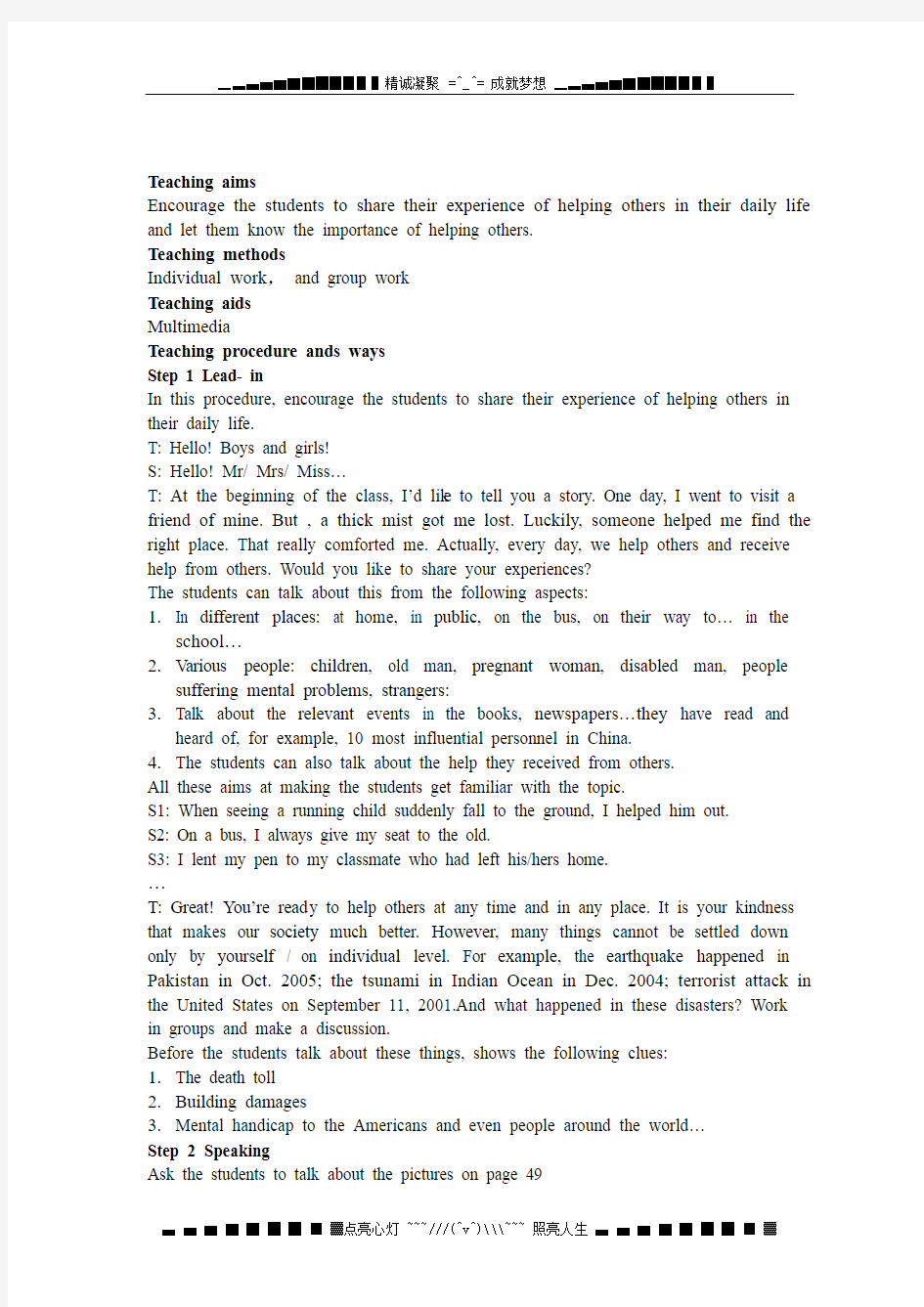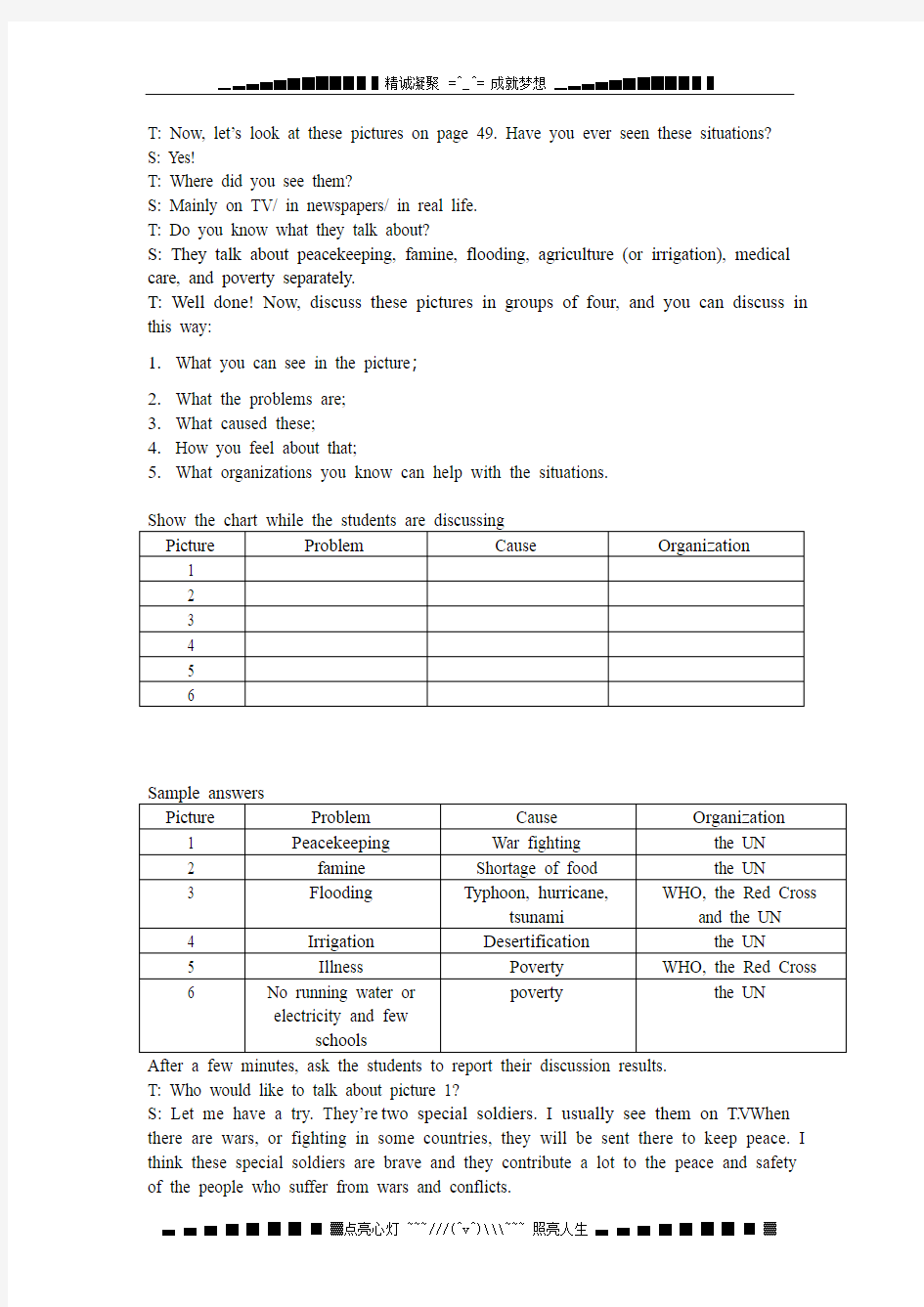

Teaching aims
Encourage the students to share their experience of helping others in their daily life and let them know the importance of helping others.
Teaching methods
Individual work,and group work
Teaching aids
Multimedia
Teaching procedure ands ways
Step 1 Lead- in
In this procedure, encourage the students to share their experience of helping others in their daily life.
T: Hello! Boys and girls!
S: Hello! Mr/ Mrs/ Miss…
T: At the beginning of the class, I’d lik e to tell you a story. One day, I went to visit a friend of mine. But , a thick mist got me lost. Luckily, someone helped me find the right place. That really comforted me. Actually, every day, we help others and receive help from others. Would you like to share your experiences?
The students can talk about this from the following aspects:
1.In different places: at home, in public, on the bus, on their way to… in the
school…
2.Various people: children, old man, pregnant woman, disabled man, people
suffering mental problems, strangers:
3.Talk about the relevant events in the books, newspapers…they have read and
heard of, for example, 10 most influential personnel in China.
4.The students can also talk about the help they received from others.
All these aims at making the students get familiar with the topic.
S1: When seeing a running child suddenly fall to the ground, I helped him out.
S2: On a bus, I always give my seat to the old.
S3: I lent my pen to my classmate who had left his/hers home.
…
T: Great! You’re read y to help others at any time and in any place. It is your kindness that makes our society much better. However, many things cannot be settled down only by yourself / on individual level. For example, the earthquake happened in Pakistan in Oct. 2005; the tsunami in Indian Ocean in Dec. 2004; terrorist attack in the United States on September 11, 2001.And what happened in these disasters? Work in groups and make a discussion.
Before the students talk about these things, shows the following clues:
1.The death toll
2.Building damages
3.Mental handicap to the Americans and even people around the world…
Step 2 Speaking
Ask the students to talk about the pictures on page 49
T: Now, let’s look at these pictures on page 49. Have you ever seen these situations? S: Yes!
T: Where did you see them?
S: Mainly on TV/ in newspapers/ in real life.
T: Do you know what they talk about?
S: They talk about peacekeeping, famine, flooding, agriculture (or irrigation), medical care, and poverty separately.
T: Well done! Now, discuss these pictures in groups of four, and you can discuss in this way:
1.What you can see in the picture;
2.What the problems are;
3.What caused these;
4.How you feel about that;
5.What organizations you know can help with the situations.
T: Who would like to talk about picture 1?
S: Let me have a try. They’re two special soldiers. I usually see them on TV. When there are wars, or fighting in some countries, they will be sent there to keep peace. I think these special soldiers are brave and they contribute a lot to the peace and safety of the people who suffer from wars and conflicts.
T: You’ve done a really great job! And can you tell us, by whom, the special soldiers are sent to keep the peace?
S1: The nations that have special soldiers.
S2: I don’t think so. I think it’s the UN.
T: Yes. You’re right! They are sent through the UN. And we’ll learn more about that in the following classes. Picture 2, who wants to have a try?
S: People in the picture are very thin, and painful because of a shortage of food. They suffer from famine. I’m sorry for them. Their most ba sic need cannot be fulfilled, to say nothing of education or entertainment. I think we shouldn’t waste food any more. By watching TV and reading newspapers, I know that our country often loans money to these countries and also give them aid. And the UN may have the relevant organization.
T: Great! How about picture 3?
S: From the picture we can see that this area was flooded. Typhoon or heavy rain has caused it. Houses there must have been destroyed. What is worse, many diseases will spread. In my opinion, people should be warned earlier, and doctors should be sent to deal with the possible diseases. And the WHO, the Red Cross, and the UN can help with the situation in the future.
T: Excellent! How about picture 4?
S: Water is pumped into the farmland. The crops grow well. So I think the field may suffer from drought or it is difficult to farm. Irrigation improvement here is necessary. Agriculture experts are also needed. I think the UN should have such an organization to help with this.
T: Very good! What about picture 5?
S: A doctor is looking at an X-ray under a lamp. He must help patients with bone problems in some poor areas. I think WHO and the Red Cross can do this.
T: Well done! How about picture 6?
S: People in small areas still live in poverty. Most of them cannot receive education as we do now, and can not play as we can. We have to cherish what we own today.
T: That’ it! And what organization do you think can help with this?
S: I think the UN can help them.
T: OK! Most of you have mentioned the UN. From that we can say that the UN can help solve many problems, and plays a very important role in the international stage, right?
S: Yes.
Step 3 Summary and homework
T: Today, we have talked about the 6 situations in this part, and learned that some countries around the world suffer from wars, natural disasters, famine, illness and poverty. And some of you have talked about your feelings. And you have known that these situations should be solved internationally, that is countries should help each other. You also mentioned some organizations that can deal with these situations, such
as the UN,the Red Cross, the WHO. In the following periods, we’ll learn more
about the UN. So, after class, you had better read books and surf the internet to collect
some useful information about the UN. OK, class is over. Goodbye, boys and girls.